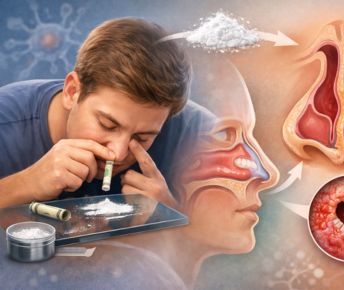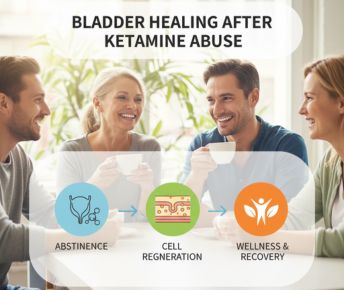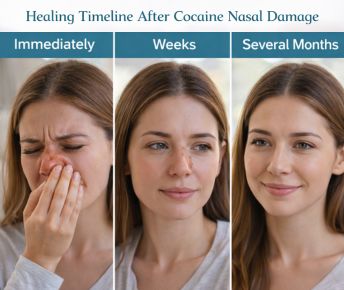The shame cycle happens when someone uses substances, then ;es on to feel shame. This shame becomes overwhelming, and causes them to then use more substances. This can soon spiral, until the ties of addiction bind this addicted person very tightly.
In this blog, we look at exactly what is the shame cycle in regards to addiction, and tell you how you can get out of it.
Getting out of this cycle often requires professional support. If you need help, speak with Samarpan Health today.
What Is The Shame Cycle?
In general terms, the cycle of shame refers to the shame, guilt and other negative feelings a person experiences when they think they have done something bad, or wrong. These feelings are unpleasant and painful, and trigger a response in the form of further “bad” actions – anything from angry outbursts to substance abuse, or even just obsessional and damaging self-talk. These behaviours, in turn, lead to more shame, low-self worth and other harmful emotions, followed by yet more negative actions, to help cope with these feelings.
The shame cycle repeats itself, and in order to break it, a person has to radically change their self-beliefs, and how they relate to emotions. When addictive behaviours become a part of this cycle of shame, it becomes even more difficult to escape. At Samarpan Recovery, we can help give you the tools and support you need, to be free of the weight of shame and the self-defeating mechanisms you may use to cope.
What is the Shame Cycle in Addiction?
In addiction, the shame cycle takes on specific characteristics. A person’s default strategy for dealing with shame, their ;-to solution for escaping their painful emotions, becomes substance abuse. Addiction impairs a person’s judgement, and destroys their resilience, focus and will-power. In addition to the shame someone may habitually struggle , the individual feels the shame and guilt of their addiction. The shame cycle becomes a vicious cycle – the person numbs their self-hating emotions with substances, then feels remorse and shame at having allowed themselves to use, only to take more substances to repeat the process of escaping from their feelings.
The shame cycle in addiction often rotates around other emotions too, such as self-hatred, low self-esteem, and a sense of worthlessness – a toxic combination of feelings that are very harmful to a person’s mental and emotional balance.
What Causes The Shame Cycle?
The cycle of shame generally has deep roots, which go back to a person’s childhood and have become a part of their conditioning. People stuck in a cycle of shame and addiction have often grown up in dysfunctional families, where shame and guilt were normalized. The person may have unconsciously taken on a low sense of self-worth from a young age.
As a result, it is usually a person’s programming that enables the cycle of shame to take root in their lives. They are often under the impression that their shame and self-loathing come from their actions. However, while this may be partly true, people frequently don’t realize that their default mental settings are creating the conditions for such negative emotions to grow.
Common causes of the shame cycle include:
- Having a troubled childhood
- Past trauma
- Experiencing abuse or bullying
- Poor self-esteem, negative body image
- Pre-existing mental wellness issues, such as anxiety or depression.
Where addiction is concerned, any conditions – past or present – that strengthen low self-worth and lack of self-confidence, are particularly likely to reinforce the cycle of shame and substance abuse.
Impact of the Shame Cycle
When substance abuse or addiction are a part of the cycle, a person faces the impact not only of their cyclical emotions, but also of the addiction itself. Since addiction and shame feed off each other, as described above, the cycle of shame saps a person’s energy, and places great strain on their mental and physical well-being. This makes it very difficult to keep up even the appearance of being well, and can impact all areas of life.
- Personal life: close intimate relationships can be difficult when someone feels they are not ;od enough. Open, honest conversation is also hard when someone tries to hide their emotions, or keeps them bottled up inside. And, of course, active addiction places a strain on mutual trust.
- Social life: again, if a person feels inadequate, they may prefer to isolate rather than go out, meet people and make friends. Or friendships may not last long if the person feels unworthy. A person may also tend to gravitate towards friends who use substances or lack self-worth.
- Professional life: self-doubt can cause a person anxiety and stress at the workplace, as can having to try and control or hide an addiction. Shame and guilt can make a person avoid socializing with colleagues, and they can end up lonely.
Finally, the cycle of shame can stop people reaching out for the help they need. They may feel their substance abuse and their lack of self-care make them unworthy of receiving the support that could save them.
How to break the Shame Cycle
There is no quick fix for breaking the shame cycle, but the first step is always to acknowledge and allow whatever you are feeling.
- Whenever you feel shame, guilt, or any other negative feelings, try to be aware of them. Just allow them to be, without judgement or resistance. Pay particular attention to feelings that trigger you – ones that make you want to use, or feel worse about yourself.
- Practice having compassion for yourself: beating yourself up or shaming yourself won’t help. Give yourself permission to not be perfect.
- Challenge your self-beliefs: look for your qualities and positive character traits. Question whether you really deserve to be ashamed, or if it’s just your own negative self-talk telling you that. Think of positive things you can say to yourself.
- Get out of your own mind: start socializing more, exercise, find wholesome activities, spend less time alone and focused only on your own world.
- Reach out to friends, family or support groups for motivation and support.
- Seek professional help, such as counselling or therapy, if you are struggling.
Many people find it hard to ask for help, particularly if they’re ashamed of problems such as addiction. But the right help can spare you lots of misery and loneliness. Whatever your struggles, at Samarpan Recovery we guide and support you on the road to recovery.
Samarpan is a specialized international Substance Use Disorder (De-Addiction) and Process Addiction rehab in Pune, India that accepts a maximum of 26 clients. We only accept clients on a voluntary basis and have a highly structured program that encompasses the most effective approaches to Substance Use Disorder and addiction. The facility is set in the rolling hills Mulshi, with clients having either individual or shared rooms, in a modern resort-like facility, staffed by Internationally Accredited Professionals. Samarpan is fully licensed under The MSMHA and is also an accredited ;RSKI-CENAPS Centre of Excellence offering a program from 5 to 13 weeks.
If you or someone you care about is considering treatment for substance use disorder or process addictions, we can help. Contact us now on admissions@samarpan.in or phone/WhatsApp us on +91 81809 19090.
























 Yes, many offer serene environments and solid therapeutic frameworks. However, quality varies, so it’s essential to research accreditation, staff credentials, and therapeutic depth.
Yes, many offer serene environments and solid therapeutic frameworks. However, quality varies, so it’s essential to research accreditation, staff credentials, and therapeutic depth.




